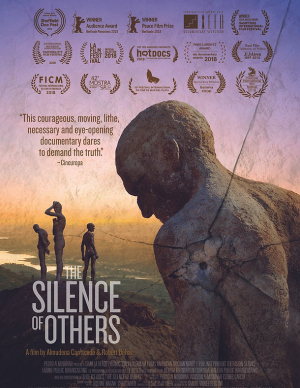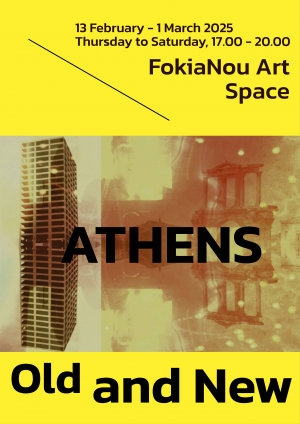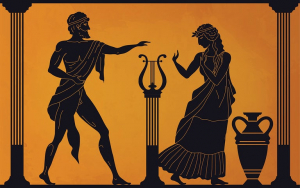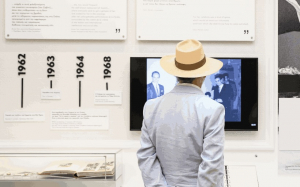XpatAthens
Cinedoc Presents: The Silence of Others – Screening Tour In Greece
With the support of the Cervantes Institute of Athens, Cinedoc presents the Oscar-nominated documentary The Silence of Others in Athens, Volos, and Thessaloniki.
In Spanish, with Greek subtitles.
To watch the official trailer, please CLICK HERE!
Synopsis
Directors’ Note
SCREENING SCHEDULE
With the support of the Cervantes Institute of Athens and in collaboration with the Oral History Groups (O.P.I.).
- Athens – French Institute
Premiere in Athens: Thursday, February 20, 20:00
After the screening, a discussion will follow with Dimitris Filippis, Associate Professor at the Hellenic Open University - "Spanish Language and Culture" Program.
Presale: https://www.more.com/gr-el/tickets/cinema/festival/cinedoc-2025-the-silence-of-others/
- Athens – Danaos Cinema
Sunday, February 23, 16:00
Presale: https://www.danaoscinema.gr/movie/i-siopi-ton-allon-cinedoc-2025/
- Thessaloniki – “Stavros Tornes” Hall
Wednesday, February 19, 18:45
The screening will be introduced by Nikos Marantzidis, Professor of Political Science, University of Macedonia.
Presale: https://www.filmfestival.gr/el/cinemas-gr/program
- Volos – Nea Ionia Cultural Center
Saturday, March 15, 20:00
Presale: ENTEKA - Digital Prints
Info: https://www.facebook.com/CineDocVolos
About CineDoc
For More Information: https://www.cinedoc.gr | cinedocanemon@gmail.com
Athens English Comedy Club - February 16th Show!
Duration: 1h30 + interval
Recommended for ages 16+
Address: ELIART Theater - Konstantinoupoleos 127 (closest to Kerameikos and Metaxourgeio metro stations).
The theatre is wheelchair accessible.
Map: https://maps.app.goo.gl/uV8fHDWXcJM7YJr78
Info: 6987994689 // athensenglishcomedyclub@gmail.com
* * * * * * * * * * * * * * * * * * * * * * * * * * * * * * * * * * * * * * * * * * * * *
Sign up to our newsletter for direct-to-email updates and exclusive ticket offers!: http://eepurl.com/it6PzQ
Follow us on social media!
Facebook: https://www.facebook.com/athensenglishcomedyclub
Instagram: https://www.instagram.com/athensenglishcomedyclub/
Twitter: https://twitter.com/Englishcomedygr
YouTube: https://www.youtube.com/c/AthensEnglishComedyClub
TikTok:https://www.tiktok.com/@athensenglishcomedyclub
Come and laugh! Nay! Come and chortle. Or better yet, guffaw!
Tapping For Kids With EFT Practitioner Eleni Vardaki
- Safe and Gentle: EFT presents a low-risk, accessible way of enhancing the emotional well-being of kids and adolescents. It’s a non-invasive modality that is safe for children of all ages. When the stress is reduced to a low enough level using EFT, a child’s negative thinking about a particular stressor tends to shift to a more neutral or positive frame of mind. In EFT therapy, we call this a Client Cognitive Reframe. It happens organically as part of the therapeutic EFT process.
-
Emotional Regulation: EFT helps children articulate their feelings and manage their emotions effectively. For instance, a child experiencing bullying can tap on specific points while they talk about their feelings of fear or sadness. This not only alleviates immediate distress but also fosters resilience in handling future emotional challenges.
-
Emotion-Focused Tapping: Working with an EFT Practitioner helps kids identify specific emotions (like anxiety or sadness) and tap through them together.
-
Specific Event Tapping: If necessary, an EFT Practitioner may also encourage kids to recall a specific upsetting event while tapping to neutralize the associated negative emotions.
- Addressing Trauma: For older kids who may have experienced things like bullying or a traumatic meltdown in an important exam, EFT serves as a gentle therapeutic intervention that can help them process these events in a safe manner. Various play- based EFT strategies are used for younger kids to facilitate communication and the processing of trauma.
- Increased Confidence: Regular tapping sessions can empower young people by enhancing their self-esteem and confidence. As they learn to manage their emotions using EFT, they become more equipped to face academic pressures and social situation without overwhelming anxiety.
- Accessible Stress Management: Kids can easily integrate EFT into their daily routines by make tapping a regular practice. They can do EFT before exams or presentations to ease anxiety, or even before going to bed as many struggle with sleep issues due to anxiety or racing minds.
- Improved Sleep: Adolescents often experience heightened stress levels when faced with increased academic demands or unkind peer behaviours. Working with a tapping specialist helps children address these concerns, which in turn improves their sleep.
- Mindfulness and Self-Reflection: EFT encourages mindfulness by prompting teens to focus on their feelings while engaging in the tapping process. It’s a self-reflective practice that encourages emotional awareness and healthier coping strategies.
- Tapping for Clearing Blocks to Achieving a Specific Goal: EFT for achieving goals is great for adolescents. They enjoy having that 1:1 support to clear any emotional or stress blocks to achieving a goal that is important to them regarding grades, exams, presentations, changing a bad habit, friendships goals, etc.
- Rapid Results: Children often lack the emotional baggage adults carry, so EFT can yield even quicker results, enabling them to process negative emotions more efficiently. Plus, by learning tapping techniques, they gain valuable skills to manage their emotions in between sessions. This agency further increasing the speed of results as they don’t need to wait for their next session with their EFT Practitioner to make progress.

Email: eleni@elenivardaki.com
Athens Old & New - Group Show At FokiaNou Art Space
Hours: Thursday – Saturday, 17.00 -20.00
Opening: Thursday, 20 February, 18.00
From the current building boom to infrastructure “improvements”, the growth in mass tourism to less tangible shifts in the local culture, the changes create the circumstances for reflection on how the city once was. The exhibition captures this particular moment in time, contributing to a creative dialogue and prompting the public to reflect on their relationship with the city and its constant transformation.



2nd Full-Day Conference Of The Child & Adolescent Mental Health Initiative
Things You Didn’t Know About Greek Mythology
Here are some surprising things you might not know about Greek mythology!
1. Zeus Wasn’t Always the Supreme God
-
Elysium – A paradise for heroes and the virtuous.
-
Asphodel Meadows – A place for ordinary souls who weren’t exceptionally good or bad.
-
Tartarus – A deep abyss where the wicked were punished, including the Titans. This complex afterlife system showcased how Greek mythology viewed justice beyond the mortal world.
Gilad Atzmon's Bass Less Quartet Live At Theatre Of The No



A Plant-Based Pop-Up Brunch At Mona Athens
📅 Now until February 16
🕐 13:00 – 18:00 Brunch
📍 Mona’s Living Room
February At The Maria Callas Museum
Wednesday, February 12th
- Date: Wednesday, February 12th
- Showtimes: 19:30 & 21:00
- Duration: 45 minutes
- Price: €25 (includes Museum entry before the show, optional)
- Required reservation via more.com. Book your tickets HERE!
- Note: Part of the performance will be standing.
Sunday, February 16th
- Date: Sunday, February 16th
- Time: 12:00
- Duration: 65 minutes
- Ages: 4-12 years
- Price: €10 per child & €10 for a companion
- Required reservation via more.com. Reserve your spot HERE!
Saturday, February 22nd
- Date: Saturday, February 22nd
- Time: 12:30
- Duration: 50 minutes
- Price: €14 (Discounts available)
- Required reservation via more.com. Book your spot HERE!
Every Thursday in February
- Dates: Thursdays (6, 13, 20, 27 February)
- Time: 12:30
- Duration: 50 minutes
- Price: €7 for 65+ (Tour is free)
- Call to reserve: 210 44 04 204
Sunday, February 9th
- Date: Sunday, February 9th
- Time: 11:30-12:30 & 13:15-14:15
- Ages: 4-8 years
- Price: €13 per child and companion
- Required reservation: 210 44 04 204 (Tuesday-Saturday 10:00-18:00)
Sunday, February 23rd
- Date: Sunday, February 23rd
- Time: 11:30-12:30
- Ages: 4-10 years
- Price: €10 per child and companion
- Required reservation: 210 44 04 204 (Tuesday-Saturday 10:00-18:00)
Sunday, February 23rd
- Date: Sunday, February 23rd
- Time: 9:30 AM
- Ages: 8 months to 2.5 years
- Price: €10 per child and companion
- Required reservation: 210 44 04 204 (Tuesday-Saturday 10:00-18:00)
Stoiximan AegeanBall Festival, A Celebration Of Basketball, Returns This June













